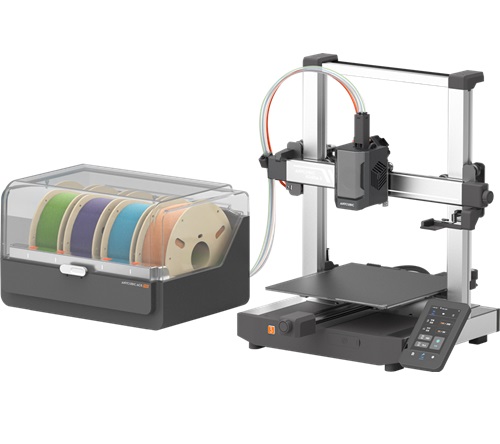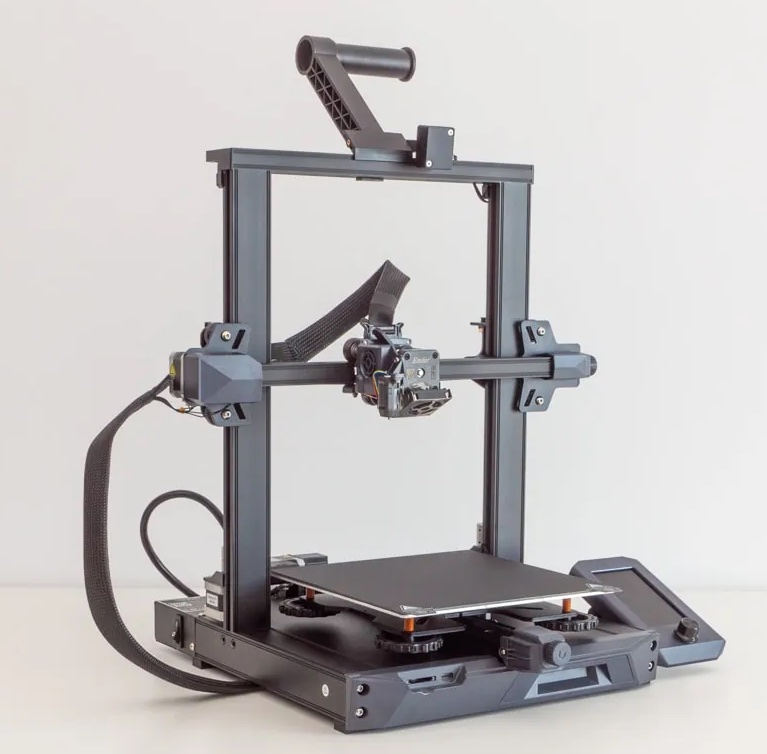Compare Kobra 3 Combo vs Ender 3 S1 Plus
Comparison between the best 3D printers
Choose the best 3D printer at the best price. The cheapest 3D printers are here.
Buy a 3D printer here with 3D Fila.
 |
 |
|
| Model | Kobra 3 Combo[BUY Kobra 3 Combo] |
Ender 3 S1 Plus[BUY Ender 3 S1 Plus] |
| Printing Material | Filament | Filament |
| Buy Filament for Anycubic Kobra 3 Combo | Buy Filament forCreality 3D Ender 3 S1 Plus | |
| Estimated price | $349,00 | $549,00 |
| Manufacturer | Anycubic | Creality 3D |
| Release Year | 2024 | 2022 |
| Print Volume [mm] | 250x250x260 | 300x300x300 |
| Printer Size [mm] | 452x504x483 | 557x535x655 |
| Weight [kg] | 9,2 | 10,25 |
| Power Loss Recovery | YES | YES |
| Enclosed printer | NO | NO |
| Bed Leveling | Automatic | Automatic |
| Filament End Sensor | YES | YES |
| Bed type | Heated | Heated |
| Power supply system | Direct Drive | Direct Drive |
| Standard nozzle | 0,4 | 0,4 |
| Maximum Nozzle Temperature [°C] | 300 | 260 |
| Maximum Bed Temperature [°C] | 110 | 100 |
| Maximum printing speed [mm/s] | 600 | 150 |
| Filament holder | YES | YES |
| Camera for supervision | NO | NO |
| Recommended filaments | PLA, PETG, ABS, PP, HIPS | PLA, PETG, Tritan, Flex, ABS |
| Recommended slicers | Anycubic Slicer, Cura, Orca Slicer | Cura, Simplify, Slic3r, IdeaMaker |
| Maximum Resolution [mm] | 0,1 | 0,1 |
| Processor | 32 bits | |
| Display | Touchscreen 4,3'' | Display touchscreen 4,3'' |
| Power Supply | 400 W | 110/220V / 350W |
| Connectivity | USB, Wi-Fi, Cloud | SD / USB |
| Operating systems | Windows, Linux, Macbook | Windows, Mac, Linux |
| Date of registration in the system | 2024-06-27 | 2022-11-04 |
| Release date | 2024 | 2022 |
| Extra features | The Anycubic Kobra 3 Combo offers advanced features, including multi-filament printing with the ACE (Anycubic Color Engine) system, allowing for quick switching of up to four filaments. It features automatic bed leveling, nozzle clogging detection, and integrated filament drying during printing. The printer supports technical materials such as ABS, ASA, Nylon, and PC, thanks to the hotend that reaches 300°C and the heated bed up to 110°C. In addition, it has a 4.3-inch touchscreen and compatibility with various slicers such as Anycubic Slicer, Cura, and Orca Slicer. | The Ender 3 S1 Plus 3D Printer offers quality prints with a build volume of 300x300x300 mm. It stands out for its "Sprite" extruder, automatic bed leveling and easy-to-use touchscreen. It has excellent safety features and simple assembly. In addition, it features temperature uniformity in the heated bed, suitable for various materials. |
| Support for multiple colors and materials (AMS and CFS) | YES | NO |
Notes * |
||
| Cost-benefit | 8 / 10 | 6 / 10 |
| Hardware | 4 / 10 | 2.4 / 10 |
| Tela | . | . |
| Print volume | 4 / 10 | 4 / 10 |
| Performance | 5 / 10 | 1 / 10 |
| [BUY Kobra 3 Combo] | [BUY Ender 3 S1 Plus] |
Conclusion |
| In comparing the Anycubic Kobra 3 Combo and the Creality 3D Ender 3 S1 Plus, it is clear that each printer excels in different areas, catering to diverse user needs and preferences. The Kobra 3 Combo, released in 2024, stands out with its innovative features including multi-filament printing capabilities, a hotend that supports higher temperatures for advanced materials, and automatic bed leveling. Its maximum printing speed of 600 mm/s allows for faster production, making it an ideal choice for those who prioritize both versatility and speed. Furthermore, with a solid score in cost-benefit analysis and superior performance metrics, it provides excellent value, especially for users who may intend to experiment with a variety of filament types. On the other hand, the Ender 3 S1 Plus, while slightly more expensive, offers a larger print volume and features aimed at user-friendliness and safety. Its robust build quality, effective temperature management, and easy assembly cater well to newcomers and those looking for a reliable everyday printer. However, it falls short in terms of performance and advanced features compared to the Kobra 3 Combo. Overall, if you are seeking a printer that combines advanced capabilities and performance at an attractive price point, the Kobra 3 Combo is the preferable choice. Conversely, if larger print volume and user-friendly design are your priorities, the Ender 3 S1 Plus presents a solid, though less flexible, alternative. Ultimately, the decision will depend on specific printing needs and user experience preferences. |

